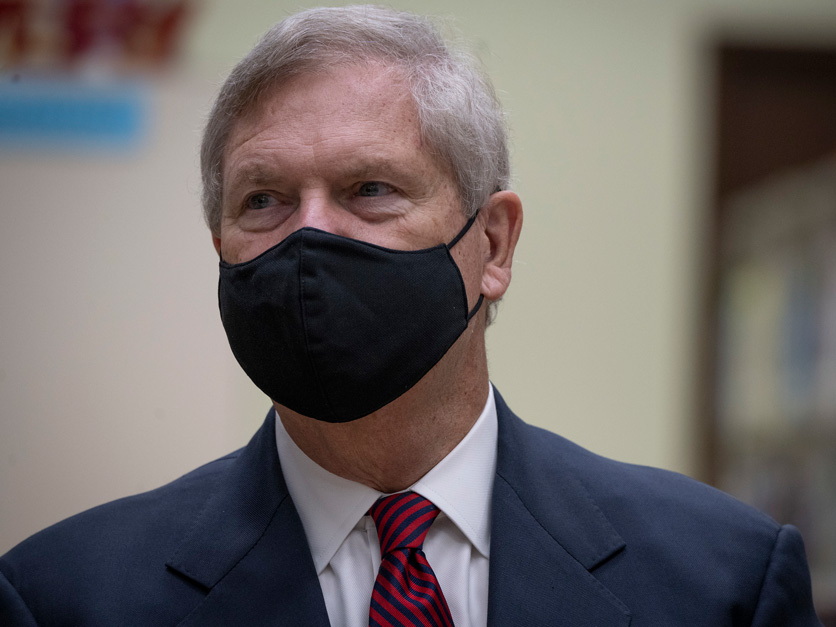Register today for a free Agri-Pulse webinar, “Creating the path to more sustainable pork,” which will explore how pork producers are responding to sustainability challenges. Agri-Pulse Editor Sara Wyant will moderate the event on Feb. 17 at noon EST.
Agriculture Secretary Tom Vilsack is in Jefferson City, Mo., today to announce that USDA is ready to start taking applications for demonstration projects to help the department develop “climate-smart” products.
“We're calling it the Partnerships for Climate-Smart Commodities,” Vilsack said in an interview with Agri-Pulse, and noted again it would be funded with $1 billion from the Commodity Credit Corp.
USDA received over 400 comments on what it initially called the Climate-Smart Agriculture and Forestry Partnership Initiative.
Applications will be accepted until April 8 for larger projects of $5 million to $100 million, and until May 27 for projects costing between $250,000 and $5 million.
The second category is “to make sure that small-sized farming operations and underserved populations are able to participate fully,” said Vilsack, who is making the announcement at Lincoln University, one of the nation’s 107 historically Black colleges and universities.
The three- to five-year effort, which also includes forestry, is voluntary, incentive-based and open to all production methods and commodities. Farmers and ranchers would agree to implement certain conservation practices, whose efficacy in reducing greenhouse gases and providing other environmental benefits would then be measured.
A broad range of entities, including conservation districts, land-grant institutions, nonprofits and local or state governments, can apply, and they will determine how to compensate participating producers, Vilsack said.
Production costs to squeeze farm profits
Rising production costs are going to eat into farm profits this year, and it’s not just fertilizer that’s a challenge. Feed expenses will be up sharply for livestock and poultry producers this year, and labor costs will be significantly higher, USDA economists say in their farm income forecast for 2022.
Inflation also will take a bite. Net cash farm income is forecast to rise $1.9 billion to $136.1 billion this year. But that will actually be a 2.1% decline when adjusted for inflation.
Fertilizer prices will be 12% higher this year, while feed and labor expenses will both rise about 6%, USDA says.
Take note: While revenue from crops and livestock looks good, the picture isn’t as bright for specialty crops like fruits, vegetables and nuts. Those farms are expected to see their net cash income fall nearly 24%, says USDA economist Carrie Litkowski.
Tighter broadband funding rules sought
Senate GOP Whip John Thune, R-S.D., is seeking to tighten requirements for funding rural broadband through the Agriculture Department. USDA received $2 billion through the bipartisan infrastructure bill for the department’s Reconnect program.
Under the USDA program, at least 50% of the households in an eligible area must lack sufficient broadband access.
Thune is introducing a bill this week that would increase that threshold to 80%. That would bring it in line with requirements for the $42.5 billion in broadband funding that the Commerce Department will distribute to states under the infrastructure bill.
Judge clarifies ruling on enforcement delay for Prop 12
California cannot enforce Proposition 12 against any business not in compliance with housing standards for sows that produce pork sold in the state, a Superior Court judge clarified in a ruling last week.
The judge's initial ruling delaying enforcement for six months applied specifically to the plaintiffs in the lawsuit challenging the law, including restaurants and retailers.
The state has yet to issue final regulations implementing the law, which went into effect Jan. 1.
Biden admin pushes for quick action on competition bill
Now that the House and Senate have both approved legislation aimed at making the U.S. better equipped to compete with China, the Biden administration is pushing lawmakers to make haste in negotiating a uniform bill that Congress can send to the White House.
“Now we have to move to the next stage and do so swiftly and I’m urging Congress in the strongest possible terms to move quickly … to start negotiations and work out the differences between the House and Senate bills.,” Commerce Secretary Gina Raimondo said Friday after the House narrowly passed the America COMPETES Act.
Take Note: There was strong support in the Senate for its version of the competition bill, but the House bill only passed narrowly and over strong Republican opposition. Raimundo noted that the trade title in both bills was the “most contentious” and downplayed its importance to the overall legislation.
“While trade is an incredibly important part of our competition strategy, we have to find common ground … and not let those controversial pieces of the trade title bog down this whole negotiation,” she said.
“I look forward to the House and Senate quickly coming together to find a path forward and putting a bill on my desk as soon as possible for my signature. America can’t afford to wait,” President Joe Biden noted in a statement Friday.
US, EU bridge seafood trade divide
The U.S. and European Union have reached a food safety “equivalency” agreement that will allow trade in oysters, clams, mussels, and scallops to resume. Differences in food safety requirements halted trade for about a decade.
Food safety and other factors continue to block U.S. exports of pork, poultry and most beef, but U.S. Trade Representative Katherine Tai offered some optimism.
“Today’s announcement represents a positive step in the trade relationship between the United States and EU,” Tai said Friday. “The Biden-Harris Administration is committed to both addressing trade barriers and building new opportunities for U.S. producers, and we will continue to work to strengthen the U.S.-EU trade relationship.”
He said it: “There are more bald eagles in the lower 48 states than there are black row crop farmers, and we really need to make sure we’re not at the verge of extinction.” – that’s P.J. Haynie, chairman of the National Black Growers Council, speaking on this week’s Open Mic.
Send comments, questions and tips to bill@agri-pulse.com.



![Steve headshot 250x200[1]](http://www.agri-pulse.com/ext/resources/Headshots/Staff-Photos/thumb/Steve_Headshot_250x200[1].JPG?1738947158)

